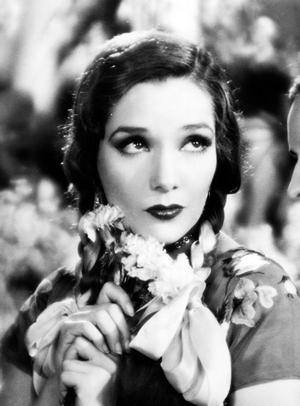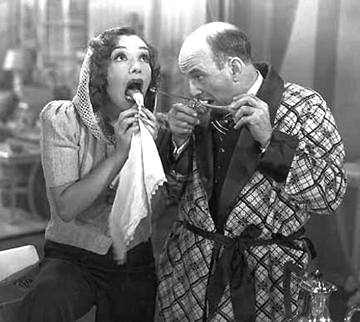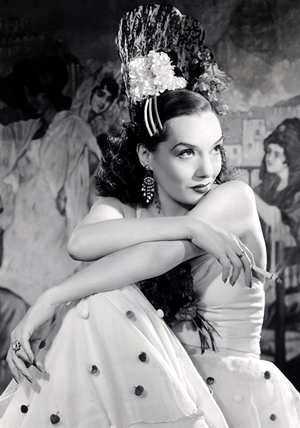
 |
|
|
|
Here we sing the praises of Lupe Velez, a good singer, excellent dancer and hilarious comedienne who fit the bill for fiery latin señoritas in Hollywood of the 1930s. Starting out in silent comedies and dramas, she was a familiar face but never a first-rank star. Her lively (that's an understatement) personality has probably been seen most in a pair of excerpts from 1934's Hollywood Party. In one Lupe is a jungle woman opposite Jimmy Durante's "Schnarzan", a scene most noted for a costume that keeps threatening to malfunction. Later in the show she plays a gag at a bar with Laurel & Hardy that shows excellent comedy timing. If Ms. Velez didn't want to be known as a hot party girl, something went very wrong. Ms. Velez worked consistently through the '30s, eventually settling at RKO, which in 1939 put her in a film that did well enough to inspire a popular series. The Girl From Mexico sees ad man Dennis Lindsay (Donald Woods) dispatched to Mexico to find a famous singer for a sponsored radio show. He discovers the singing fireball Carmelita Fuentes (Velez), who washes her laundry in a restaurant's fountain, and then performs an expert song & dance act at the same venue that night. Hired on the spot, Carmelita is anxious to see New York but also to spend more time with Dennis. When he must go to work she sweet-talks Dennis' mischievous Uncle Matt (comedian Leon Errol) into taking her to a ball game and a wrestling match, where she loses her voice screaming. Thus Carmelita's radio audition is a washout, and she's slated to return South of the Border. This delights Dennis's snooty Aunt Della (Elisabeth Risdon) and his cynical fianceé Elizabeth (Linda Hayes), who spend most of their time insulting the vivacious singer, or reacting with withering stares to her uninhibited, provocative remarks. How will Carmelita stay in the Big Apple, and how will she win Dennis's heart? 
Hollywood didn't make too many films with Latin Americans as leading characters, and The Girl From Mexico is even more of a rarity in that it respects the culture of its Mexican star. Carmelita Fuentes is a slick performer but also a relatively unworldly campesina. The script carefully shows that her trip to the States is approved by both her family and a judge, and a Mexican Consul in New York checks up to make sure Fuentes' morals aren't being compromised. When fireworks erupt with the social-climbing Elizabeth and Della, Carmelita always comes out on top while the Anglo DAR types are humiliated. That in itself is a fun twist of expectations. Lupe Velez flashes enormous smiles; her eyes seem to dance and sparkle when she's happy. Carmelita doesn't hide her feelings and is not afraid to speak her mind, to anybody. The closest actress to Lupe's style of clowning is Brazil's Carmen Miranda, but Carmelita is even more animated and exaggerated, all in good spirit, like a big kid. Desi Arnaz started out at RKO at this time, and it's probable that he was influenced by Lupe's trademark gag -- whenever she loses her temper or gets excited she rattles off Spanish dialogue at a machine-gun pace. Velez knows darn well that the Gringos don't realizew that she's calling Liz and Della "dogfaces"; more than once she bursts into a Latin American version of "eeney meeney miney moe". Although writers Lionel Houser and Joseph Fields are clearly fans of Lupe and load the film in her favor, we have to think that the Mexican actress helped shape her character and contributed plenty of these ad libs on her own. The best line in the movie (and the funniest in the series) is delivered in sing-song cadence by Lupe, as she describes her feeling for Dennis: "Do you know what love is? " (Grabs heart) "Love makes your heart go thumpa thumpa thumpa, like a little baby falling down the stairs." Velez's hand gesture indicating the bouncing baby is priceless. Lupe Valdez has good chemistry with comic actor Leon Errol. They misbehave like two kids playing hooky, and communicate quite a bit of fun together. Originally from Australia, Errol is a natural vaudeville ham and a potential scene-stealer, but Lupe knows everybody will be watching her mischievous face. She also has some good interaction with Ward Bond, who does reasonably well as a Mexican wrester who owns a nightclub. Other Mexicans in the cast are played by bona fide Latins, a wise move when they have to trade fast Spanish dialogue with the star. The Girl From Mexico was a hit. Audiences apparently reacted just as strongly to Leon Errol as they did Lupe Velez, so the series began in earnest with 1940's The Mexican Spitfire. Director Leslie Goodwins is in charge and continues with the same kind of madcap comic pace that audiences apparently loved. Joseph Fields and Charles E. Roberts settle on a diminished formula that unfortunately reduces Carmelita Fuentes' role in her own series: the spotlight is unofficially shared with Leon Errol, who probably has more screen time in his freqent double roles. Also, the married Carmelita no longer sings -- the producers have apparently decided to instead go with short bursts of her excitable clowning. The storyline for The Mexican Spitfire is simple. Elisabeth Risdon and Linda Hayes are back, only this time they're trying to bust up the Dennis-Carmelita marriage. It's clear that they consider Carmelita a worthless Mexican tramp who merits no consideration. As before, the two snobs' tricks backfire every time. Leon Errol appears both as the misbehaving Matt and as Lord Basil Epping, a stuffy English liquor client that Dennis must get to sign an ad contract. Just as in an I Love Lucy episode, Carmelita causes trouble by trying to help Dennis get the account. Matt goes in disguise to impersonate Lord Epping and the rest of the movie is a fairly good extended mistaken identity farce. The other major personnel change is that Dennis's boss at the ad agency, is now Cecil Kellaway, playing the part straight and quiet. 
Lupe Velez's role is diminished in this more modest program picture, and the jokes with Lord Epping become repetitive. In 1940 these gags probably seemed fast-paced and sharply rendered. The "good material" with Velez throwing a verbal fit or jumping around a room isn't as frequent: she more often than not sets up jokes for Leon Errol to carry. The continuing series doesn't alter the formula very much. Carmelita defends her marriage three times against the poacher Elisabeth; Linda Hayes dropped out of the series after one more feature. Carmelita repeatedly tries to help Dennis win or retain an important account. Leon Errol impersonates Lord Epping seemingly forever, without the cast ever catching on. Like "Darren" in Bewitched, co-star Donald Woods also dropped out after a third installment -- the role certainly wasn't doing him any favors. Charles "Buddy" Rogers (Wings) joined the show as the new Dennis. The other six films are almost interchangeable -- practically remakes of each other instead of a series of sequels. In the years before Television these series answered the audience's need for recurring, familiar characters. The movies are all about seventy minutes in length, not much longer than a TV series episode. Arriving twice a year, a Saint mystery or a Mexican Spitfire show promised a known item, the same only different. Mexican Spitfire Out West (1940) sees the cast rushing off to Reno, where Carmelita applies for a divorce. She did the same thing in the previous picture, but in Mexico. Errol not only does his Lord Epping bit, but also a third impersonation, Epping's valet. Mexican Spitfire's Baby (1941) has some original ideas: Dennis and Carmelita's war orphan turns out to be a WW1 orphan, a 20-something babe named Fifi (Marion Martin) who gets Dennis and Matt in trouble with their respective wives. Unfortunately, straightening things out requires Matt to impersonate Lord Epping again. Mexican Spitfire at Sea brings back the Fifi character. On a cruise to Hawaii Uncle Matt does his Lord Epping imitation and Fifi pretends to be Mrs. Lindsay, but the events seem like carbon copies of scenes we've seen before. Released in March of 1942, the film must have seemed especially awkward -- all of America was suddenly acutely aware of Hawaii as an embattled war zone. Mexican Spitfire Sees a Ghost (1942) dumps the cast into a fake haunted house set up by foreign agents manufacturing explosives. Again, the whole show is Leon Errol's very good impersonation performance, now run so far into the ground that it's a wonder audiences could put up with it. Mantan Moreland pops his eyes out at fake ghosts, providing producer Val Lewton with an example of the spook house nonsense he didn't want to repeat in his new "B" Horror unit. The movie became famous for an entirely different reason, though. It was the main feature when RKO gave Orson Welles' uncut The Magnificent Ambersons its one and only sneak preview. The audience that turned out for the silly comedy had little patience for Welles' 2.5 hour epic of family drama. Their negative preview cards were used as ammunition to slash and re-shoot what should have been Welles' best film, his masterpiece. 
Charles "Buddy" Rogers went to war, so his place in Mexican Spitfire's Elephant (1942) was taken by Walter Reed (Seven Men from Now). Marion Martin returned, but not as Fifi. This time Carmelita gets involved with jewel smugglers, who hide their contraband in a little ceramic elephant. The highlight is the appearance of a full-sized painted elephant, but most of the film still revolves around Leon Errol and his Lord Epping/Matt mixups. Finally, Mexican Spitfire's Blessed Event (1943) should have been retitled "Mexican Spitfire's Greatest Hits" -- everything that happens takes place in a weird Deja-Vu world of repeated jokes and situations. Carmelita gets a baby Ocelot but must "borrow" a baby to help out Dennis get another advertising contract. Perhaps these eight films were simply not meant to be seen so close together -- the series stayed reasonably popular. Watching Errol harrumph and hunch his shoulders as the oddball Lord Epping (and Uncle Matt impersonating Lord Epping) gets to be too much of a good thing. For this reviewer, Errol as Epping is not much funnier than Jack Lemmon's turn as the strangely unfunny "Lord X" in Billy Wilder's Irma La Douce. But Leon Errol retained his "B" level popularity, and even reprised Lord Epping in a 1951 short subject. Mexican Spitfire's Blessed Event was Lupe Velez's last American film. Her next film was her last ever, a respected Mexican version of Nana by Roberto Gavaldón. Descriptions of her sad demise at only age 36 can be easily found on the web; I've always resented the cynical treatment given the facts in Kenneth Anger's book Hollywood Babylon. I recommend the Mexican Spitfire 8-Movie Collection for the wonderful first film and a spot-check on most of the others (I also have a soft spot for Zasu Pitts, who appears in a couple of the sequels). Lupe Velez is excellent in every one; I just wish that the series had more variety and was more centered on her marvelous comic character. 
The Warner Archive Collection DVD-R of Mexican Spitfire 8-Movie Collection comes on four discs in a slightly fatter keep case. All the transfers are good, with the first film in slightly rougher shape (mostly minor scratching) and the later sequels looking newer than new.
On a scale of Excellent, Good, Fair, and Poor,
Mexican Spitfire 8-Movie Collection rates:
Reviews on the Savant main site have additional credits information and are often updated and annotated with reader input and graphics. Also, don't forget the 2010 Savant Wish List. T'was Ever Thus.
Review Staff | About DVD Talk | Newsletter Subscribe | Join DVD Talk Forum |
| ||||||||||||||||||